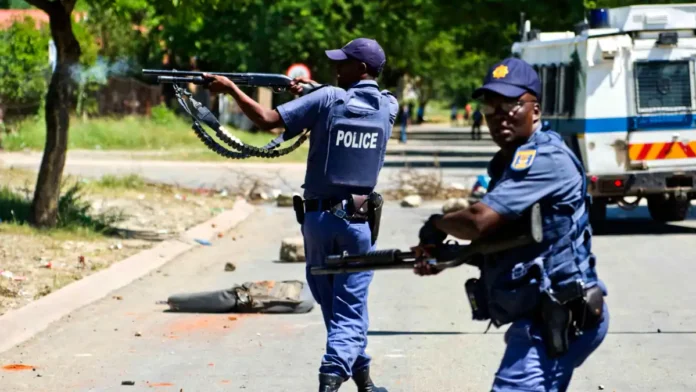Mthatha – A cloud of fear has lifted over Mthatha West, but the scars of a reign of terror remain. Chief Dalindzolo Mareke, the traditional leader accused of orchestrating a protection fee extortion racket that crippled the community, is dead.
He was killed on Wednesday, September 4th, 2024, during a shootout with the National Intervention Unit in Mthatha. Two other armed suspects were also killed in the incident, and one police officer was injured.
The news of Mareke’s death has brought a mix of relief and apprehension. While many residents breathe a sigh of relief, the fear of retaliation lingers. Businesses, once forced to operate under the shadow of extortion, are cautiously optimistic, but the question of who will fill the void left by Mareke remains unanswered.
The extent of Mareke’s alleged grip on the community was chilling. Schools were forced to shut their doors, businesses were forced to close, and even prominent artists like Nathi Mankayi cancelled performances, fearing for their safety.
Last month, it was reported that Laphumikwezi Primary School in Mthatha West’s Khayelitsha was forced to close after a group of men, allegedly acting on Mareke's behalf, demanded money for a cellular network tower on the school grounds.
The deputy principal was assaulted in front of pupils for refusing to hand over school funds. This incident, coupled with similar reports of extortion at other schools, including Efata School for the Blind and Mandela Park Primary School, sparked widespread concern and outrage.
The fear instilled by Mareke's alleged activities extended beyond schools. A source, speaking on condition of anonymity, described Mareke as a powerful figure who wielded significant influence in the community.
"He [Mareke] is very powerful; we’re not even allowed to mention the term ‘protection fee’. He even forced us to march in his defence, denying any accusations against him. He also monitors people’s posts on Facebook and targets them," the source revealed.
The crisis reached a tipping point when an eye-care specialist closed his Mthatha Ophthalmology Medical Practice, citing "hostile criminal activities" as the reason for his decision. This move highlighted the pervasive fear and the impact of extortion on businesses and individuals alike.
In response to the growing unrest, the Eastern Cape Chamber of Business called on the police minister to replace police officers in Mthatha, alleging that some officers were colluding with extortion syndicates.
"Some of the police have been conniving with these guys, so they need new faces, and some must be transferred elsewhere. People need to have confidence. They have not been reporting cases because, once we report them, certain police tip off the criminals, and you get a phone call. Businesses closed, and people lived in fear," said Vuyisile Ntlabathi, president of the Eastern Cape Chamber of Business.
The situation in Mthatha West reached a critical point when the AbaThembu king, Buyelekhaya Dalindyebo, visited Khayelitsha with the police, urging the reopening of schools and dismissing Mareke as a self-proclaimed chief, stating that he was not recognised on AbaThembu land. Dalindyebo's visit, however, only served to further inflame the situation.
In a recorded address to the community, Mareke vehemently denied any involvement in extortion activities, claiming that the accusations were false and spread by outsiders. He also expressed frustration with the king's visit, suggesting that Dalindyebo had a personal vendetta against him and should have consulted with him and other traditional leaders before coming to the area.
Mareke's defiance and the ongoing allegations of extortion led to a tense standoff between the community, the king, and the police. The situation remained volatile, with the Eastern Cape Chamber of Business calling for a complete overhaul of the police force in Mthatha and the national police commissioner, Fannie Masemola, announcing the arrest of eight suspects in connection with extortion and the deployment of additional police officers to the town.











